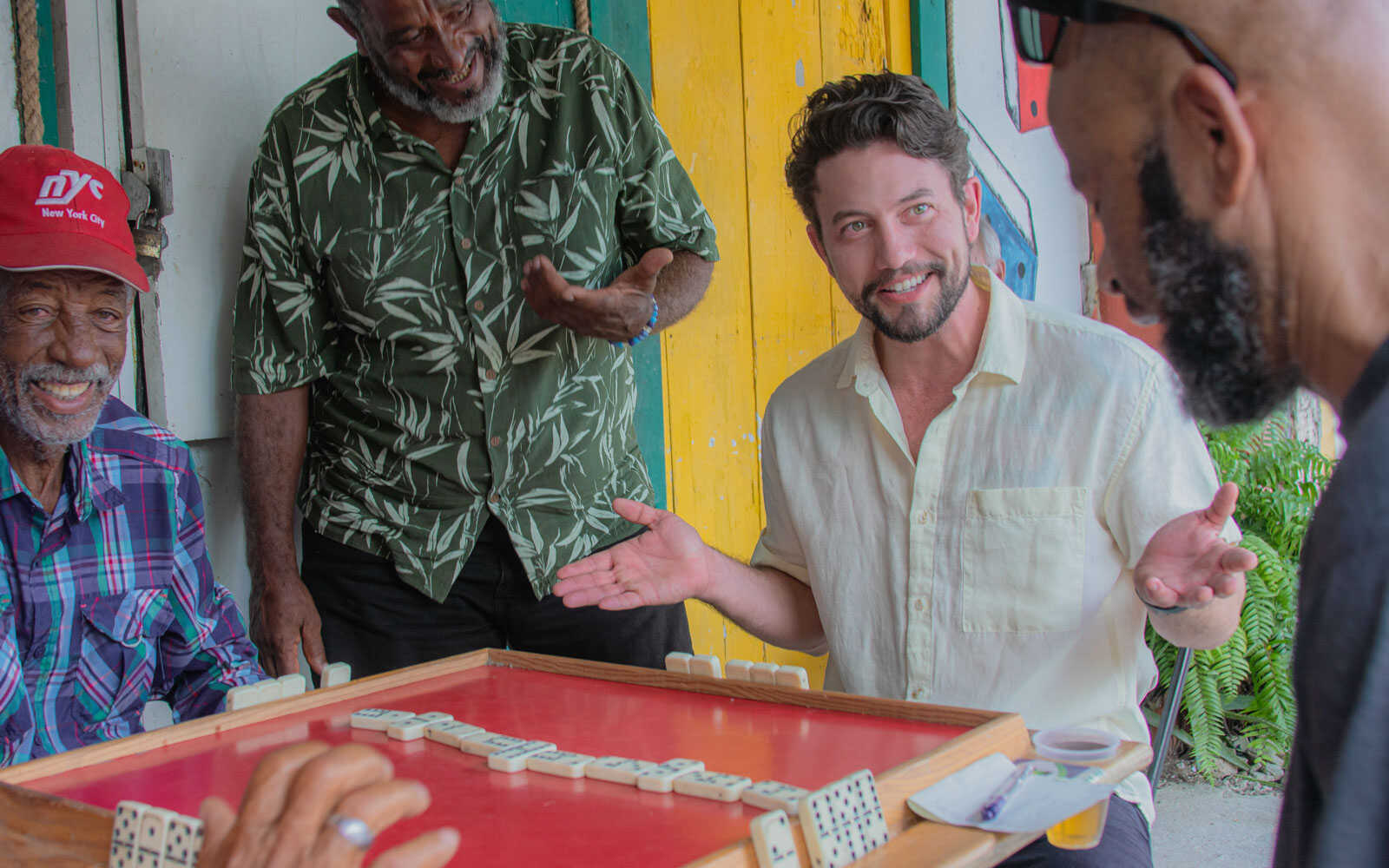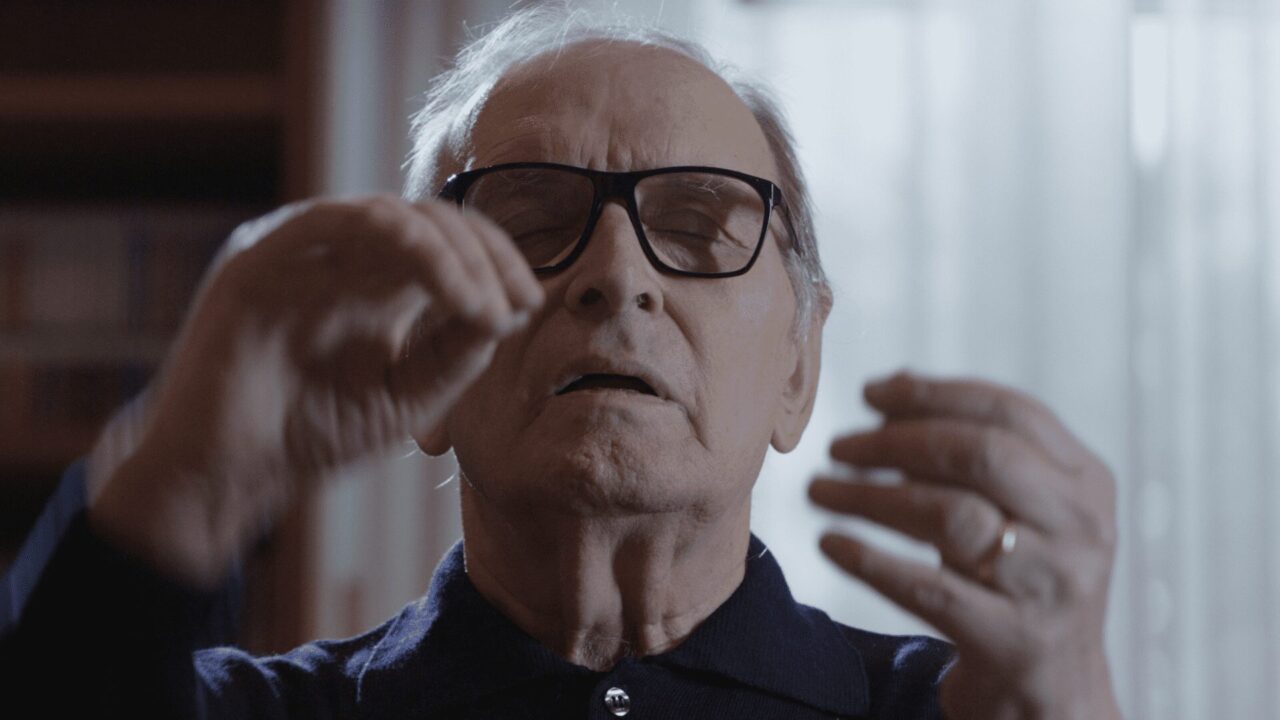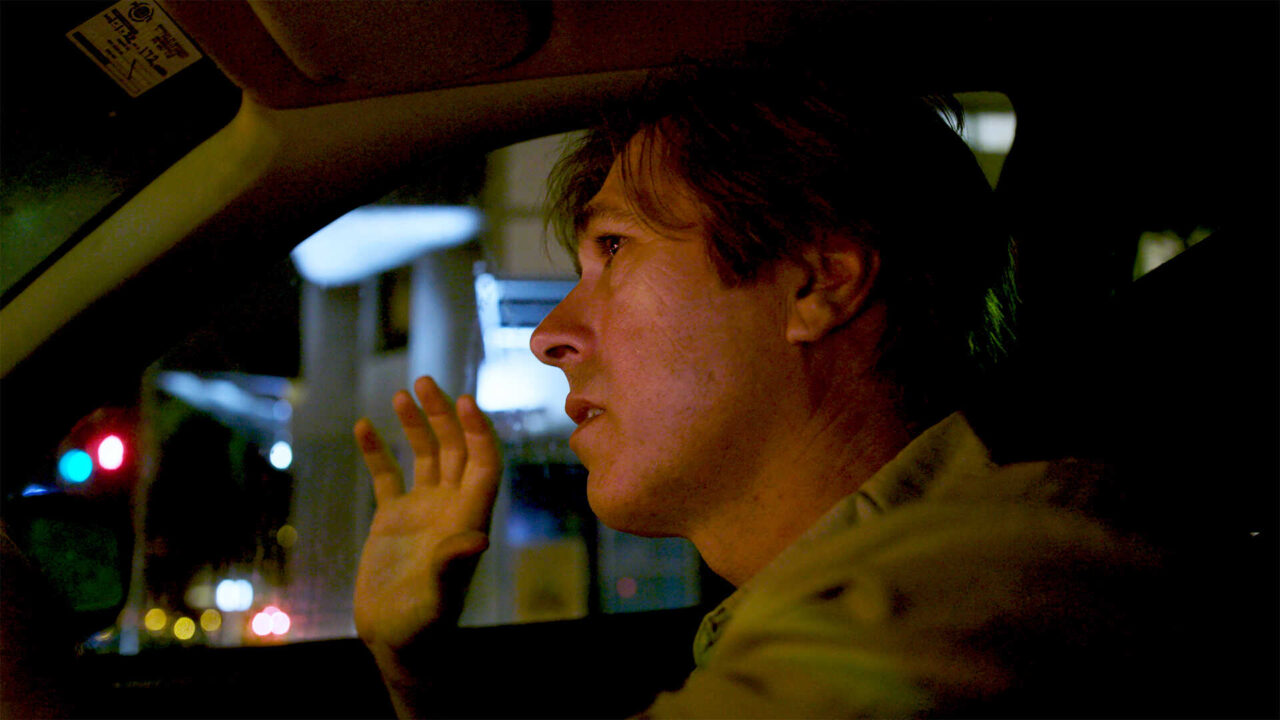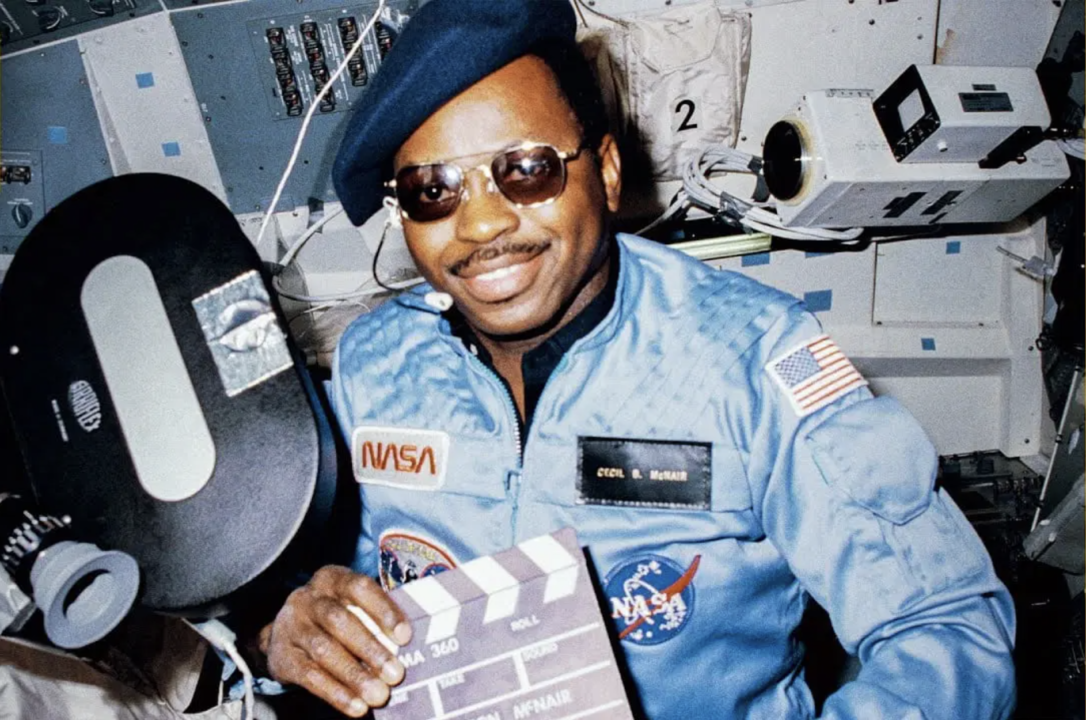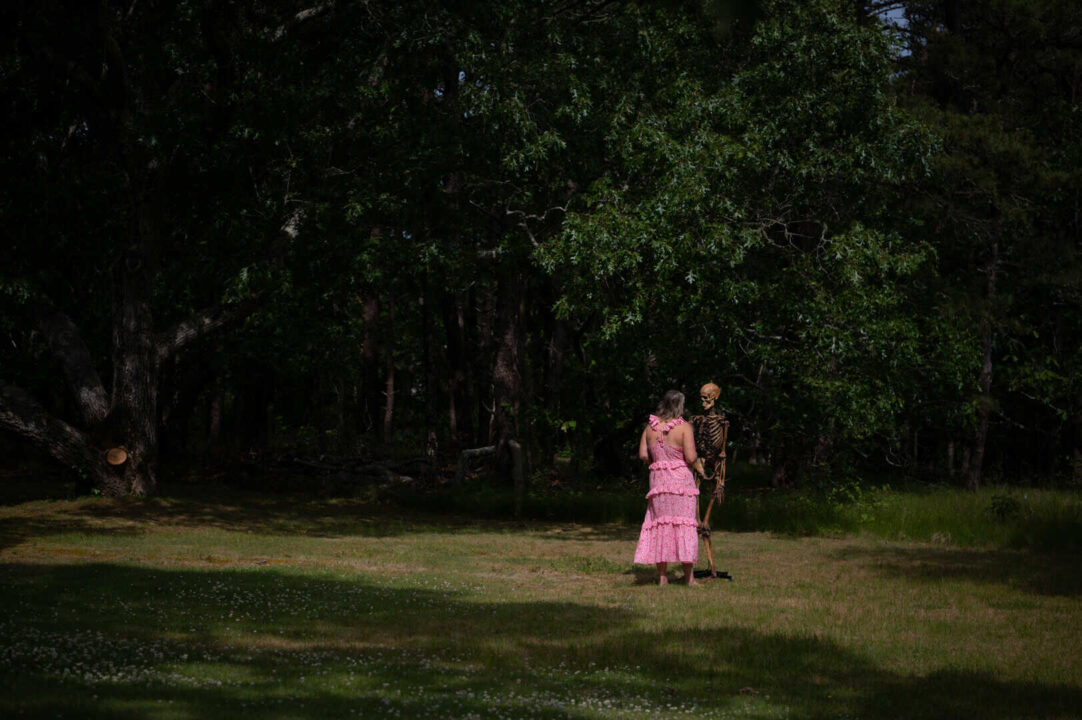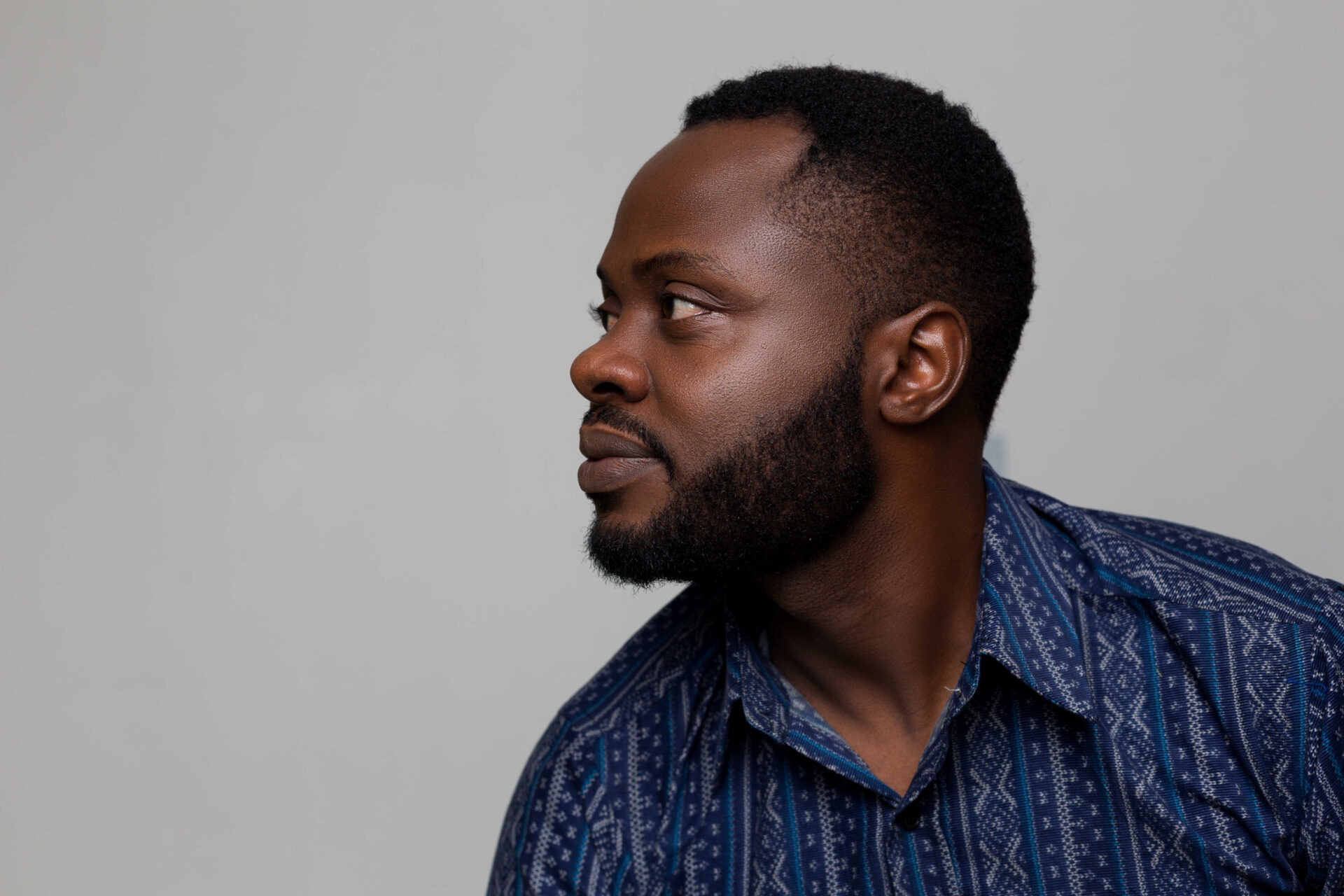'Books & Drinks': A Charming Rom-Com Set in Caribbean Paradise
For those who want a blissful, tropically-set romantic comedy that feels like a warm hug mixed with a whiff of sunscreen, look no further than Books & Drinks. Making its World Premiere at the 2024 Santa Barbara Film Festival, Books & Drinks stars Jackson Rathbone, who you may remember as Jasper from the Twilight series, playing a charismatic bookstore owner who unexpectedly finds himself receiving a windfall of funds leading to an introspective journey toward self-realization, confidence, and joy. Books & Drinks, directed by Geoffrey Cowper, is a fun and lighthearted affair that brings out the best in its cast, and the most of its on-set location.
The next best thing to winning the lottery would be inheriting a mansion in the Caribbean. It's a dream scenario that knocks thirty-something David (Rathbone) off of his feet when he is given this unexpected news by his mother. In a somewhat hilariously dark manner, David's mom drops the bombshell that his father, who she always claimed died when David was a baby but, in reality, had just recently passed away, left David a house worth $2 million in the Dominican Republic. David has no plans to uproot his life in Brooklyn and move to the Caribbean but sees that house as a means to revive his flailing Brooklyn-based independent bookstore.
David decides, with support from his fiance Maria (Nashla Bogaert), that he will travel to the DR and sell his father's house, but upon his arrival, it becomes evident that David's dad wasn't just the mansion owner, but also a big deal in this small community. The house staff, who were close to his father, pay their condolences while also trying to seduce David so that he'll become attached and not sell the house. As it turns out, the only thing that seduces David is the realtor Rachel (Clara Lago), a beautiful, bubbly brunette who very clearly sparks David's interest.
Over a couple of weeks, David and Rachel grow close, bonding over their drive and passion for life. She encourages him not to give up on his bookstore dreams and helps him come up with clever ways to attract customers. She has the idea–which personally, sounds pretty amazing– to create signature cocktails inspired by authors like a Bloody Mary for Stephen King or an absinthe-based drink for Oscar Wilde. It's at this moment that David falls for Rachel and her generous, creative spirit. You can make an educated guess about halfway through the film as to where the story is headed, and while a few curveballs are sprinkled in, there is a predictable sweetness that feels reminiscent of comforting old-school rom-coms.
The central message in Books & Drinks is to follow one's intuition to not give up on your dreams. It's a fun way to spend 94 minutes. Plus...the mansion is total eye candy, which may or may not have enticed me to look up similar properties on Zillow, just for fun.
'Ennio' is a Masterpiece Fit for a Maestro
It's been said that, at the sound of the first note, you will be able to identify an Ennio Morricone score. The duality of the music's boldness and beauty is unmistakable. We also know what will follow is a rich orchestral melody that weaves in and out of emotional landscapes. The prolific composer's influence on music scores in cinema is explored in great detail through Ennio, directed by his longtime collaborator, Cinema Paradiso filmmaker, Giuseppe Tornatore. Paying tribute to one of the industry's most legendary artists, Ennio explores the maestro’s career across his iconic film scores, including The Good, The Bad, and the Ugly, Days of Heaven, A Fistful of Dollars, and his Academy Award-winning work on The Hateful Eight, among hundreds more.
I like to listen to music when I write, and sitting down to begin this review was no different. As I opened Spotify and searched for his name, I was shocked but not surprised to see that the Ennio Morricone profile receives an average of 3.3 million listeners a month. His most recognizable song, "The Ecstasy of Gold" from The Good, The Bad, and The Ugly shows that it has been streamed nearly 69 million times and counting. These numbers, while staggering, are only a snapshot of the storied career of the Italian maestro.
The documentary runs just over two hours and thirty minutes, and every frame is packed with words of admiration from Ennio's peers, including autobiographical anecdotes from Ennio himself. Fans of his music-making process will revel in the abundance of fascinating interviews with various musicians and directors who have either worked directly with him or were indelibly inspired by him. Bringing a personal component to the film, Ennio shares stories about his childhood and reminisces about wanting to be a doctor. It was his father who convinced him to study the trumpet instead. It's a scenario you don't hear too often, parents persuading their children's career path towards the arts over medicine. From there, we weave in and out of his repertoire, growing more awestruck with each passing film score.
The film itself is very traditional in its documentary format, fueled by sit-down interviews that bounce from subject to subject. The stories themselves are larger than the formulaic way in which they are told, which seems like a conscious choice by Giuseppe Tornatore to not let stylistic filmmaking choices get in the way of the heart and soul of the film. It's clear that this documentary has been in the works for a while; some interviews have a dated, public-access look to them that seems ripe for screening in a museum.
The descriptions given about Ennio Morricone range from "very serious" and "very absorbed" to "a genius" and "a marvel." Waxing poetic about their idol, some interviewees stated that "the God of music speaks through him as if he were possessed" and "His music is... eternal." Before his passing in 2020, Ennio finally won his long overdue Oscar for Quentin Tarantino's 2015 film, The Hateful Eight. At 87 years young in 2016, Ennio Morricone set a new record: the oldest recipient of an Academy Award, proving age is nothing but a number.
Ennio is now playing in Los Angeles at Laemmle Noho with a national expansion and home entertainment release to follow.
'Disconnect Me' Attempts a 30-Day Digital Detox
This is one detox that even Gwyneth Paltrow would have trouble completing. Director Alex Lykos makes a persuasive argument to cut ties with the invisible chains of your phone in his social issue documentary, Disconnect Me. Using himself as a guinea pig, Alex embarks on a 30-day experiment of being screen-free, although TV is allowed for sanity's sake. Considered by some a "necessary evil," our attachment to our iPhones has no doubt risen to unhealthy levels and Alex's attempt to break audiences of this technology's stronghold is an admirable one. However, I'll be the first to admit that as soon as the film ended, I opened up my phone to add this to my Letterboxd watchlist.
How else would a small, independent feature like Disconnect Me get any attention if the social channels that we access via phones and tablets were non-functional? Alex dually notes that while phones are more often than not a distraction in modern life, there is most definitely a time and a place for their existence. The film begins with a brief history of the iPhone and incorporates some staggering facts that had me on high alert. Disconnect Me states, through voiceover narration and simple graphics, that the average human touches their phone 2,600 times a day and averages over 6 hours of cumulative screen time. What's even more frightening, phones have reduced our attention span to 8 seconds, which is less than that of a goldfish.
Through Alex's 30-day experiment–which required his phone, laptop, and computer to be locked away in a safe, he felt the withdrawals of easy communication with his family more intensely than his desire to go on social media. He was stressed about missing important communications from his father or his wife and found that relying on an old-school rotary phone just wasn't cutting it.
Disconnect Me, which made its World Premiere at the 2024 Santa Barbara International Film Festival, has the very specific look of an MTV doc from the mid-2000s. It is not the most sophisticated in terms of style or production quality, but the story at the heart of the film is one worth celebrating. Interestingly, the film takes intentional pauses and asks audiences to scan a QR code answering various questions, like whether we believe smartphones should be banned in schools. It's a forward-thinking approach, albeit a little contradictory given the central message of the film.
It's no surprise to discover that there are negative physical and mental consequences of being preoccupied with a phone all day. The people Alex interviews confirm that their health and overall awareness dip when glued to their devices, and I'm sure in one way or another, every audience member can relate to this. Disconnect Me is a valiant exercise in exploring life outside of one's comfort zone, and it leaves a positive impact in its wake.
'The Arc of Oblivion': A Kooky Mediation on Impermanence
Two of the documentary world's most respected filmmakers, Werner Herzog and Kirsten Johnson, give their stamp of approval to Ian Cheney's expansive and rhetorical film The Arc of Oblivion. Lending their astute insights to this cinematic meditation on mindfulness, The Arc of Oblivion playfully explores the human desire for keepsakes amidst an ever-evolving world. Confronted by a question with a myriad of possible answers, Ian Cheney encourages audiences to ponder what from this world is worth saving or, even more profoundly, "Are we insane to imagine that anything can last?"
Film is a tangible medium that has been around since the Lumière brothers presented the Cinématographe in December 1895. Images are captured and stored on rolls of film or hard drives, accessible when needed. Through the medium of film, we can experience cultures, periods, and places beyond our wildest imagination. The thought of this portal getting erased is terrifying, both from an enjoyment perspective and a historical one. As a filmmaker himself, Ian has always had a fear of losing his life's work from one accidental deletion or natural disaster. In opposition to our need for preserving history, Planet Earth archives it by burying its dead, as seen in limestone layers, tree rings, and fossils. Is that the true order of how we should approach archiving– here one minute, and gone the next?
This train of thought sparks a chain of wild hypothetical theories about memories and the human desire to want to preserve a legacy. Ian draws comparisons, quite literally, to Noah from the Bible, asking what he would take with him on his arc if he existed in today's modern times. Wanting to experience this scenario from a very method perspective, Ian enlists help from his parents and neighbor to build a 10ft arc in his backyard, using wood he excavates from the neighboring forest. This act of building a backyard arc gets Ian thinking about the fragility of memories, how to cope with their impermanence, and the theory that nothing ever "goes away"– rather, that energy is placed elsewhere.
The Arc of Oblivion has a kookiness to it that feels fresh and unexplored. The incorporation of video art, stop-motion animation, interviews with top subjects (including Johnson and Herzog), and timelapse sequences gives this unconventional thought experiment a sharp edge that is both fun and poignant. Werner Herzog is the film's Executive Producer and he makes an appearance in the last 10 minutes, breaking the fourth wall in a way that feels exciting. He comments on the power of the word "Oblivion" in the film's title, calling it a blessing because we would be miserable if we remembered everything. The human mind needs to be able to forget, he states. He even goes so far as to let us in on a little secret: Herzog discards all of the unused footage that doesn't make it into his films. Never will you see an outtake, director's cut, or extended scene. If it's not in the film, it's deleted from existence.
Acting as a philosophical springboard into the discussion of a desire for permanence, The Arc of Oblivion begs us to question, in the nicest of ways, if we are beautifully insane in our efforts to continue to preserve memories, despite the natural order of disregarding them. It's a fascinating film that I hope remains in the public's consciousness for a long, long time.
'I Didn't See You There': A Vérité-Style Documentary on Disability
Winner of the 'U.S. Documentary: Directing' award at the 2022 Sundance Film Festival, Reid Davenport takes viewers on an intimate journey of self-reflection in his documentary I Didn't See You There. Reid is a disabled filmmaker who uses his strengths as a gifted storyteller to craft simplistic yet undeniably powerful commentary on society's perception of disabled people. At times the film can be difficult to watch as we witness the ignorant behavior of strangers toward Reid but those moments also serve as a compelling reminder of how much daily acts of kindness and generosity can positively impact someone.
I Didn't See You There is a vérité-style film that is fully shot from the perspective of Reid, who often rides in his motorized scooter to get from point A to point B. Using a camera mounted to his wheelchair gives audiences an unparalleled perspective on how he views the world, and how the world views him. From his vantage point, we encounter obstacles that most able-bodied commuters take for granted, like stepping over uneven cracks in the pavement or moving around cars that block the crosswalk.
Reid details his struggles to exist in a world that routinely fails to cater to his needs and gives us an uncompromising view of how society treats people with disabilities: spoiler alert, it's not great. This is not to imply that Reid considers himself a victim, in fact, quite the contrary. While visiting family, he doubles down on chasing his dreams of sustaining a career as a biographical filmmaker. His ambition far exceeds his physical restraints and he is not shy about expressing what's on his mind. With fearlessness and passion, Reid serves as an inspiration that ultimately leaves the film on an uplifting note.
What makes I Didn't See You There resonate so much isn't necessarily in the execution but the emotion it evokes (although it's sure to stir up feelings of compassion and awareness that audiences will carry with them long after the credits roll). Practically speaking, I'm curious about the decision not to use subtitles, as that would have been beneficial during some of the scenes that are difficult to understand. Overall, however, I Didn't See You There is a fascinating portrait by Reid Davenport that qualifies as essential viewing.
I Didn't See You There is coming to VOD on Tuesday, February 20th.
'The Space Race': A Revelatory Exploration of NASA’s Black Astronauts
From National Geographic Documentary Films comes The Space Race, a revelatory exploration into the historical accomplishments of Black NASA astronauts. Directed by Lisa Cortés (The Apollo, Little Richard) and Emmy-Award winner Diego Hurtado de Mendoza, The Space Race is a compelling portrait of the National heroes whose service, up until now, has been absent from mainstream history. Now streaming on Hulu and Disney+.
Space exploration wasn’t encouraged in ethnic communities back in the 1960s. The mindset that was birthed from racial segregation and discrimination was especially not welcoming to Black Americans looking to get into the scientific fields but that didn't stop Ed Dwight, Guion Bluford, Charles Bolden, and Victor Glover from pursuing their dreams of becoming astronauts. In an attempt to combat the social injustice at the time, President John F. Kennedy announced that Captain Edward Dwight would carry the title of the country's "First Negro Astronaut.” This news was met with both applause and criticism and, unfortunately, those who were skeptical that the optics were just smoke and mirrors were proved right. In the film, Captain Dwight frustratingly admits that he believes his hiring was for political and propaganda purposes, not moral progress. America needed a positive PR spin, and he was their chosen target.
Fast forward through decades and cultural strides, The Space Race uses archival footage and current-day interviews to show the side of history that wasn't written in textbooks. Special attention is dedicated to Ron McNair, the only Black astronaut aboard the Challenger Mission, who died along with six others when the spacecraft infamously exploded just seconds after takeoff. Regrettably, we will never know the full potential of his impact on future generations but despite his untimely passing, Ron is cited as an inspiration among his peers. Ron represented hope and ability for many people, specifically within the Black community.
The Space Race thrives when we hear the men reminisce in detail about their time spent in outer space. One describes Earth as being so small that his crew circled it every 90 minutes. Another speaks of his amazement to see the countries from that high, noting there were no lines or divides that we are accustomed to seeing on maps. If only everyone could co-exist with that mentality, that we are all equal and not bound to imaginary borders or tier systems. It's a message that extends far beyond space and one that will hopefully resonate with audiences to infinity and beyond.
This review originally ran on June 13, 2023, during the Tribeca Film Festival
'My Dead Dad': Honoring a Loved One with a Unique Sendoff
A daughter fulfills a very unique postmortem request from her father in the affecting short documentary, My Dead Dad. While the title alone may elicit the assumption that this is a somber film, directors Erik Osterholm and Abby Ellis capture the celebratory aspect of honoring a loved one, and the result is an unforgettable and touching reflection on individuality and commitment to family.
Christopher Gray was an eccentric man. A former streetscape journalist for the New York Times, Chris spent most of his time looking at old buildings in the city, usually trying to convince his daughter Olivia to accompany him. Before his untimely passing at just 66 years old, Chris had made it clear in his will that he didn't want a traditional burial or cremation. His dying wish was that his skeletal remains would be reassembled and displayed in his high school's science lab. Unconventional? Sure. Crazy? Absolutely, but that didn't stop Olivia from finding the joy and humor in following through with her late dad's final request.
The film begins at the point in the story when Olivia comes face to face, or rather, face to skull, with the skeletal remains of her dad propped up on a rolling tripod. Enlisting her aunt to accompany her, Olivia embarks on a road trip to bring her dad home, stopping at tourist spots to document the adventure with her dad one last time.
Running just 25 minutes long, My Dead Dad is a darkly comedic family drama that offers an unexpected outlook on how we view death. Olivia undergoes such a unique and uncommon experience with such grace, and the filmmaking team does a commendable job capturing this moment. The triumphant score is sure to spark an emotional flurry within the audience, as we're left to reflect on the relationships we have with the loved ones in our lives.
Exclusive: Kulanen Ikyo Debuts Track from Netflix's 'The Black Book'
The Nigerian film The Black Book made history when it was released on Netflix in late September 2023. Within two days, it quickly reached 5.6 million views and landed at #3 on Netflix's worldwide film charts. The success was music to composer Kulanen Ikyo's ears. Known for his creativity within the burgeoning Nigerian film industry, Kulanen's experimental score is the emotional heartbeat of the film. The 33-track album is available on Friday, February 9th, on digital platforms here.
The Black Book, which is currently streaming on Netflix, is a crime thriller that details the heroic actions of a father seeking revenge. After his son is framed for kidnapping, a former gang member turned religious deacon takes justice into his own hands by fighting a corrupt police force to avenge his innocent son. According to online reports, The Black Book's $1,000,000 production budget marks the largest amount ever spent on a Nollywood (aka the Nigerian Hollywood) film.
Cinemacy is excited to premiere “Greetings Mr. Paul” from The Black Book (Original Motion Picture Soundtrack), below:
In "Greetings Mr. Paul," Kulanen draws inspiration from his Nigerian roots, crafting bold cinematic soundscapes that incorporate both African musical traditions and symphonic elements. The track starts slow before transforming into the recognizable theme of "The Battle Hymn of the Republic." A smooth electric guitar plucks the notes of the anthemic song while the larger piece begins to swell with triumphant horns and drums. It's a powerful work that reflects the tension of the story and brings it to life in stunning detail.
Says Kulanen of working on the film, "As a composer, connecting with the production team to understand the vision is essential. The director's bold proclamation in a CNN interview and the cinematographer Yinka Edward's aspiration to scale up hinted at the need for grandeur. So, I aimed for a sound that matched the narrative's magnitude - big, with resonating percussion and brass. Delving into dark tones at times aligned with the film's trajectory while embracing emotional peaks became a pivotal part of the composition."
"Collaborating with [director] Editi Effiong was genuinely intriguing." he went on to say. "Editi's desire for emotionally charged moments and raw grit in specific scenes set the tone for our exploration. Composing the score for The Black Book was both challenging and exciting. We created a score that, hopefully, complements the film's storyline and resonates with viewers even after the movie ends."
Award-winning composer Kulanen Ikyo grew up in Nigeria and always knew he wanted to make music. He would find random objects around his house, like an empty can and a wood baton, and turn them into instruments. He earned a degree in physics from the University of Jos but continued on the path of film scoring, attending the Film Scoring Academy of Europe. His past work includes contributions to critically acclaimed films such as Lionheart and October 1, which earned him the Africa Magic Viewers Choice Award in 2015.

